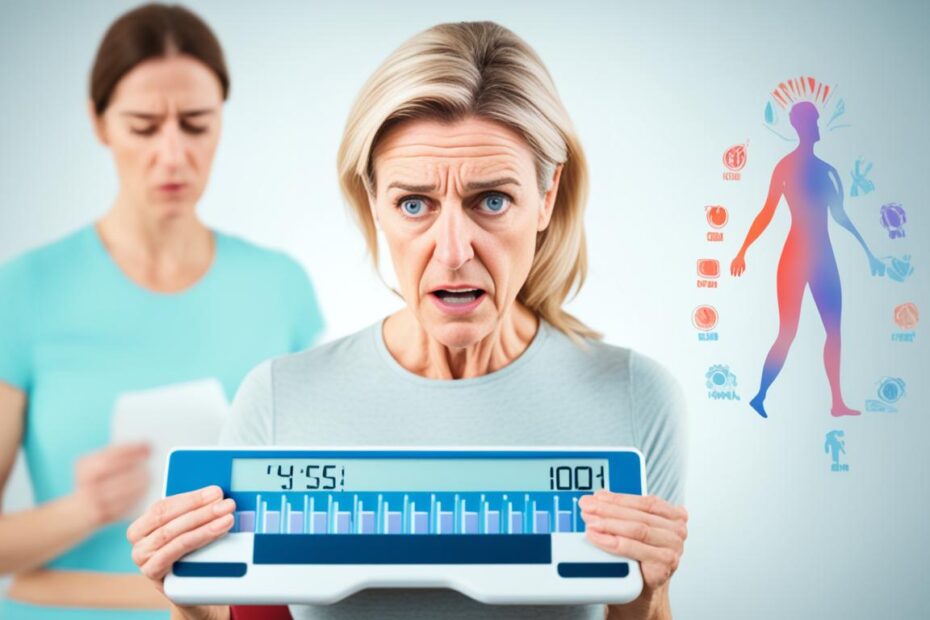I’m creeping up on my 40s and wondering about menopause and weight loss. It’s been on my mind a lot, seeing changes in my body. Menopause is part of life for us women, usually happening in our 40s or 50s. With it comes many symptoms and changes, like your weight going up and down.
Menopause is all about hormonal changes. These can make us gain weight, especially around the belly. But does losing weight have any links to menopause? It’s a good question because many women find their weight changing a lot during menopause.
Menopause brings night sweats, mood changes, and much more. I wonder if losing weight can affect this phase. Could it make menopause start earlier? Let’s look at the science to learn more about this interesting connection.
The Relationship Between Weight and Menopause
Many women gain weight during menopause. They often see this weight around their middles. This change comes because of hormonal shifts and other menopausal factors.
Hormonal Changes During Menopause
Estrogen levels go down a lot in menopause. This makes us store fat easier and lose muscle. With lower estrogen, extra fat gathers, especially around our waists.
Impact of Weight on Menopausal Transition
How heavy we are affects our menopause journey. Being overweight can make symptoms worse, like hot flashes. But, staying at a good weight can make these signs less painful.
Body Composition Shifts in Midlife
In our 40s and 50s, our bodies change. We lose muscle and gain fat. This change slows our metabolism, making it tough to keep weight off. In our 50s, women often gain 1.5 pounds yearly.

To fight these body changes, exercise really helps. This is especially true for strength training. Also, eating a healthy, lower-calorie diet helps keep your weight in check.
- Aim for 150 minutes of moderate exercise weekly
- Include strength training exercises twice a week
- Reduce daily calorie intake by about 200 calories
- Focus on nutrient-rich foods
It’s natural to see weight changes during menopause. But, living healthy can make these changes easier to bear. It also boosts your general health and happiness.
Can Weight Loss Cause Menopause?
Weight loss doesn’t directly cause menopause. But, it changes our hormonal balance. I’m in my late 40s, noticing body changes. I wonder how weight links with menopause.
Menopause usually happens from 45-55, affected by genes and age. Big changes in weight can mess with our hormones. Losing a lot of weight might lower estrogen. This can mess up periods. But, it’s not a clear cause and effect.

Before menopause, perimenopause starts. This can be up to 10 years before. Hormones swing and might make us gain weight. Oddly, both high and low estrogen might stash more fat. That’s why weight changes are common close to menopause.
Usually, we gain weight. But, some lose weight at menopause. This might happen because muscle goes down. It changes how we burn calories and manage weight.
Keeping a healthy weight as we get older is important. Losing weight at this time is hard. But with exercise, good food, and less stress, it’s possible to stay healthy.
Moving through menopause is different for each woman. If weight or menopause worries you, talking to a doctor is a good idea. They can give personal advice.
Common Weight Changes During Menopause
As I go through menopause, I see big changes in how my body looks. It’s normal for my weight to go up and down now. Many of us get a “menopause belly.” Let’s talk about these usual weight changes.
Weight Gain Patterns
During this time, more women gain weight than lose it. Each year, in their 50s, many women add about 1.5 pounds. This can change how our clothes fit and our body shapes. Hormone changes really affect this, touching our hunger and how our body uses food.
Fat Distribution Shifts
One big change is where our bodies store fat. Before, it was often on our hips and thighs. Now, it gathers around our middle, making the “menopause belly.” This stomach fat is not just about looks. It also links to more heart and diabetes risks.
Muscle Mass Reduction
With lower estrogen, we lose muscle mass. This change makes our metabolism slower. It might be harder to keep a healthy weight. Adding strength training to my life has helped. It keeps my muscles strong and boosts my metabolism.
Knowing about these weight changes in menopause helps me. I focus on eating well and staying active. This way, I hope to keep my body in good balance during this big life change.
Factors Contributing to Menopausal Weight Fluctuations
Weight changes during menopause are complex. Several things make our weight go up and down. Let’s look at what they are.
Hormones are a big deal in this. When estrogen and progesterone drop, our body notice. Our metabolism slows, and we can gain weight, mainly in the belly.
Our way of living matters a lot too. Life can get more stressful during midlife. This might lead to less exercise or eating more comfort foods. These can add pounds without us noticing.
Metabolism also changes over time. Our body starts burning fewer calories as we grow older. Eating less to not gain weight becomes important, though it’s not easy.
- Genetics influence how we react to menopause
- Hot flashes can cause sleep problems, messing with hunger
- Less muscle mass means slower metabolism
Knowing all this can help us keep our weight in check during menopause. Eating well and staying active are key. This way, we might handle the changes better.
Health Implications of Weight Changes in Menopause
During menopause, weight changes can lead to big health risks. These shifts don’t just affect our bodies in the mirror. They also influence how we feel overall, in significant ways.
Heart Health Concerns
More weight, especially around the belly, can up the risk of heart problems. This fat can cause high blood pressure and bad cholesterol. It’s really important to look after our hearts as we get older.
Bone Strength Changes
Menopause also affects our bones. Losing weight fast can make us lose bone quicker, raising osteoporosis risk. But, too much weight may hurt our joints, maybe causing arthritis. For strong bones, keeping a healthy weight is essential.
Effects on Metabolism
As we get older, our metabolism slows, making it harder to manage weight. It can also up our chances of getting diabetes type 2. Staying active and eating right can help fight these slow-downs in metabolism.
- Watch your weight to protect your heart
- Keep bones strong with proper nutrition
- Stay active to boost metabolism
Knowing these health risks can help us stay healthy during menopause. It’s all about finding the right balance and looking after our changing bodies.
Strategies for Maintaining a Healthy Weight During Menopause
Keeping a healthy weight during menopause isn’t easy. Women often gain 1½ pounds each year in their 40s and 50s. But, there are tips to help you stay fit and feel great.
Eating right is very important. I try to have over 30 different plants each week in my meals. This makes me more energetic and helps my thyroid work well. Adding more protein makes me feel full and cuts my hunger. I choose foods like salmon and avocado for managing my weight.
Don’t forget to exercise. Doctors recommend 150 minutes of medium activity every week. I prefer exercising in the morning because it burns more fat. I also do strength training twice weekly to keep my muscles firm.
Getting enough sleep is crucial. Lack of sleep can cause you to gain weight. I make sure to have a steady sleep routine and avoid eating late at night.
I also drink less alcohol now. It can disturb your sleep and cause overeating. Instead of alcohol, I have hot water with lemon in the mornings. It helps my blood sugar stay balanced.
These changes help more than just your weight. They keep you feeling good and healthy. For extra help with handling menopause, take a look at this useful guide.
The Role of Lifestyle Factors in Menopausal Symptoms
Lifestyle choices are key in managing menopause symptoms. Exercise can help a lot. It reduces hot flashes and boosts mood. Eating well keeps hormones stable and symptoms light.
Menopausal stress is common but can be lessened. I do meditation and yoga to stay relaxed. It’s nice how calmness improves how I feel. Avoiding certain food and drink helps with hot flashes. I drink less coffee, alcohol, and eat fewer spicy foods.
Hormone therapy is an option for some. Yet, it may not help with weight. Always talk to a doctor for the best advice. What helps varies for each woman. Focus on healthy living to manage mood and sleep changes better.
